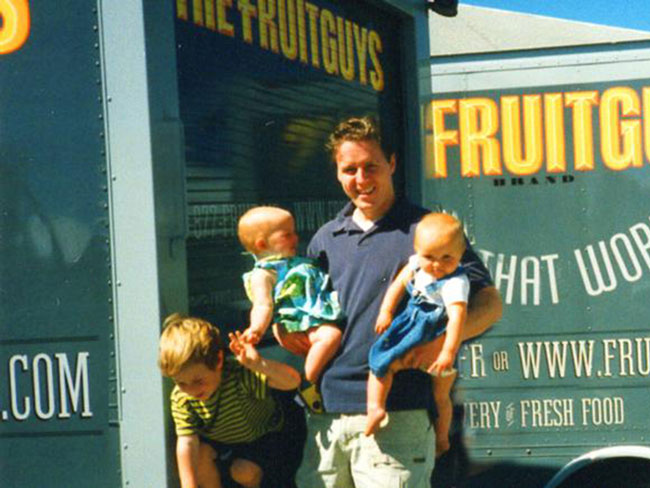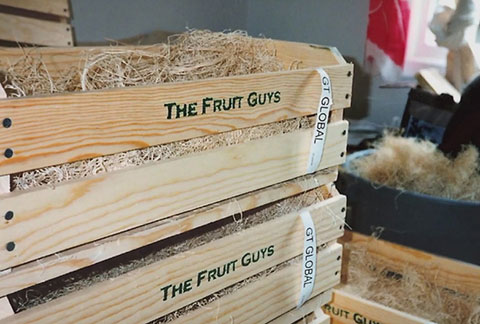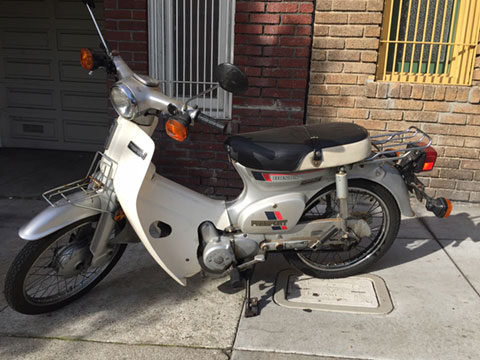Coming of Age
- By Chris Mittelstaedt
- Last Updated On
- Reading Time: 7 mins.
 I owe the birth of The FruitGuys to the creative power of, well, desperation.
I owe the birth of The FruitGuys to the creative power of, well, desperation.
It was 1997. My wife, Pia, and I had been married for a year and were living in a small one-bedroom apartment in San Francisco’s North Beach neighborhood. I was between jobs—trying to break into advertising—and had taken a temp assignment in the business services office of the Fairmont hotel. I was 28 at the time, and my boss was a perpetually hungover 19-year-old who called me, endearingly, “Fax Boy.” My job was relatively simple: wait for faxes, then put them in envelopes and run them upstairs, where I’d slip them quietly under guests’ doors. I delivered faxes to musician David Crosby and Marilyn Quayle (from her husband, former Vice President Dan).
I’ve always been a hustler and a hard worker. My first job was washing dishes at Friendly’s restaurant when I was 15—the manager there had refused to promote me to scooping ice cream at the coveted window spot because I was the “best little dishwasher” he’d ever had. Still hustling 13 years later, I put the same enthusiasm into my fax running: I’d take the stairs to beat the elevators; I’d time how long it took me from receipt of fax to delivery, intending always to improve my speed. I was a fax-delivery geek.
A few weeks into my gig, an executive at Swank Audio Visuals (the company that ran the Fairmont’s business services office) stopped by and told me I “had promise.” His face was a leathery tan, and his 1950s radio-announcer voice sounded like it had taken shape over years of cigarette smoking and negotiations over whiskey sours. He told me, as he patted me on the back, that he had heard great things about my work and that one day I could move up and perhaps manage a small service center of my own. It seemed I was going places that I really didn’t want to go.
Surprise!
It was around this time that Pia and I discovered she was pregnant. As a young couple with no money living in San Francisco, pregnancy seemed to exert a terrifying gravitational pull that hurled us into an existential orbit shared with the rest of humanity—a metaphor that also inspired thoughts of falling and burning up upon reentry. My wife and I were overwhelmed. We cried when we read the pregnancy test. We hugged; we felt excited and amazed. About 24 hours later, I had a panic attack. It hit me all at once: My wife had just started a new job. Her health insurance hadn’t even kicked in. Could she tell them she was pregnant? I was a fax boy, made $9.50 an hour, and had no real job prospects. I needed to do something fast.
I called a friend of mine and told him that I needed to start a business. I had run a painting franchise business while in college for College Pro Painters. I figured if I had done it before, I could do it again. My brother-in-law was working at Montgomery Securities in San Francisco, pushing a coffee cart to the traders on the floor. I asked him about his work: What did people eat during their day? I started talking to other workers in the growing Internet space—everyone was drinking Jolt Cola, eating chocolate-covered espresso beans, and feeling generally unhealthy. What about fruit? My friend and I investigated the wholesale produce markets one day at 3 a.m., and by 6 a.m we were sketching out a rough business plan at Caffe Puccini in North Beach. We would deliver fresh fruit to office workers throughout the city—they would have easy access to healthier snacks, and we might start to make a living.
First, we needed to find customers, but we had no product and no prior history of selling fruit to offices—or anyone! We went to office buildings and stood in front of the company directories, copying names into our notebooks. At one building, the security guard came over and told us that we couldn’t stand in front of the displays for long periods, so he would let us copy names for a few minutes, make us step outside, then let us back in to continue our work. We raced back to my apartment and used the phone book (crazy, right?) to look up phone numbers and cold-call companies to talk to them about ordering fruit. We faxed over rate sheets on my thermal-paper fax machine.
We landed four or five businesses back then—some are still with us today. Companies liked the idea so much, and they were willing to wait a few weeks for our service to start. Every time we landed an account, we’d play “Danke Schoen” and sing and dance around my apartment in celebration. One company—the Bank of Liechtenstein (aka GT Global)—was kind enough to pay us in advance, which gave us the $350 in seed cash that we needed to buy produce for our first deliveries.
 We built wooden crates by hand in my brother-in-law’s garage with the help of my wife’s stepfather, who’s a carpenter. We stenciled The FruitGuys” and our home telephone number on the side. Pia and I changed our home voice-mail message so that it said, “Thank you for calling The FruitGuys—please press 1 to leave a message.” (Pause.) “For Chris and Pia, please press 2.”
We built wooden crates by hand in my brother-in-law’s garage with the help of my wife’s stepfather, who’s a carpenter. We stenciled The FruitGuys” and our home telephone number on the side. Pia and I changed our home voice-mail message so that it said, “Thank you for calling The FruitGuys—please press 1 to leave a message.” (Pause.) “For Chris and Pia, please press 2.”
Want fruit for your office?
Get your office a free sample TODAY!The Birth of The FruitGuys
At 4 a.m. on Monday, February 16, 1998, we packed the crates with fruit in our kitchen while Pia (now six months pregnant) moved boxes and watched as we loaded up my friend’s Honda Civic. The car was so stuffed with fruit crates that I couldn’t fit in the passenger seat. I putt-putt-putted behind the fruit car on my wife’s 70cc Honda Passport scooter.

The business grew fast—we were in the right place at the right time. We didn’t have enough money to buy a truck, so we rented U-Haul vans every Sunday evening just before they closed, giving us 24 hours to make deliveries and get the trucks back without being charged for an extra day. When we could afford a down payment, we bought a $12,000 used delivery truck that had been used by a deli. I had to get a San Francisco “A” parking permit for it and find parking on the street in North Beach. We had no storage capacity, so we took any leftover fruit to St. Anthony’s Dining Room in the Tenderloin to help in their efforts to feed the homeless.
My original founding partner eventually left the business, and I brought a new partner on board (go, Erik!). We grew quickly as the dot-com boom hit its stride. We delivered fruit to Napster when they were in stealth mode and wouldn’t give us their name—we had to use a secret knock to let them know the fruit was outside their door. I delivered to eBay when founder Pierre Omidyar was still in start-up mode. In 2000, Pia was again pregnant—this time with twins—and I was finally starting to feel less like a delivery driver and more like a start-up’s CEO. I had recently gotten word that Webvan was having problems and was selling off their trucks, so I went to their Oakland warehouse and negotiated to buy five trucks at a considerable discount. Things were good!
And then everything crashed.
During the dot-com bust, we lost business and had to lay off half of our staff. I was back to doing all the jobs I had hired for and delegated. I was sick to my stomach nearly all the time about having to fire people and constantly worried about whether the business would survive. At night, after working 14- to 18-hour days, I’d come home to find my wife nursing the twins while methodically stuffing statements into envelopes. We were living on credit cards, and I remember calling my dad and telling him I feared the business would end up bankrupt.
But then two things happened. An eBay employee who liked our service and who had made money when eBay went public heard that we were struggling and showed up one day with a $10,000 check. I asked him if he wanted to become a partner, and he just smiled and said no. It was a gift; he thought we were doing something good. He lifted my spirits and helped us out tremendously. It was a moment that was deeply important and has forever impacted my desire to “pay it forward.” We also started getting calls from people who had lost their jobs in San Francisco during the crash. They asked us to send fruit to them in other cities like Philadelphia, New York, and Chicago. It took us a while, but we later opened an East Coast hub in Philly and a Midwest hub in Chicago. We began building a business that was able to buy seasonally from local farmers not just in the Bay Area but from different regions all across the country.
Happy 18th Birthday!
Today we distribute fruit to offices from more than ten hubs nationwide and have 125 employees. We work with more than 100 independent farmers across the U.S. In 2015, we donated more than 1.3 million servings of fruit to organizations that feed the hungry. Last year our nonprofit project—The FruitGuys Community Fund—gave away $35,000 in grants to eight small farms for sustainability projects. This concept, born out of desperation 18 years ago, has taken off globally—I talk with companies all over the world who have copied our original model. I feel lucky and deeply thankful for every moment of The FruitGuys. I could never have imagined the journey this little business would take us on, and I couldn’t have asked for better people to work with our clients to serve. So happy 18th birthday to The FruitGuys! And thank you to all of our clients, employees, alumni, farmers, vendors, and supporters. We’re finally old enough to vote!
Chris Mittelstaedt is the founder and CEO of The FruitGuys. He lives in San Francisco with his wife, their three kids, and their two dogs.
Get tips for your office
Be an office hero!Recent Articles
Office Potluck Inspiration: Fruit Boards to Wow Your Coworkers
Summer Fruit Recipes to Savor at the Office
Back-to-Work Wellness Tips for a Successful Q4
The 5 Best Fruits for Protein (and How to Enjoy Them at Work)
How to Choose the Right Organic Produce Supplier for Your Office
Subscribe to our Newsletter
"*" indicates required fields



